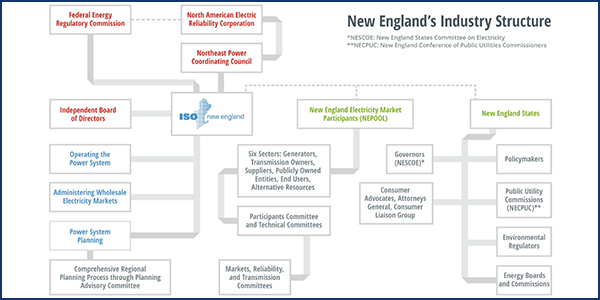The latest in a series of state official-led online technical forums to discuss ISO-NE’s governance issues publicly on Thursday focused on transparency in the RTO’s decision-making.
Anne George, vice president of external relations and corporate communications at ISO-NE, said the RTO has “a strong tradition of outreach and engagement with the New England states, as well as NEPOOL stakeholders.”
Katie Dykes, commissioner of Connecticut’s Department of Energy and Environmental Protection, acknowledged that the RTO does “a terrific job of providing responsive and professional outreach to all the states.” She added, however, that there is a difference between the outreach George referenced and the “opportunity for dialogue and real transparency with respect to insights and visibility into how the actions and decisions of the executive team and the ISO New England board are actually taken.”
Neither ISO-NE Board of Directors nor NEPOOL stakeholder meetings are open to the public. According to the vision statement from the New England States Committee on Electricity (NESCOE), which spurred the forums, states and stakeholders only see “exceptionally high-level summaries of board discussions provided by ISO-NE management.” The result is “an unacceptable constraint on facilitating independent insight and review by stakeholders about what data, material and other resources the board consider in developing its guidance to management and how it balances divergent interests in their decision-making.” (See “‘Lack of Transparency’ Criticized,” States Demand ‘Central Role’ in ISO-NE Market Design.)
George said she did not want to speak for the RTO’s board but signaled that its members are not blind to current events.
“The point is that [board members] heard you all through the vision statement, and they’re willing to have those conversations,” George said.
Another conversation centers on the makeup of ISO-NE’s Joint Nominating Committee, which selects the RTO’s board members. The committee comprises seven incumbent board members, six market participants — one from each of NEPOOL’s sectors — and only one shared vote for the six New England states.
Dykes said the concept of a shared vote between “six sovereign states” creates barriers and challenges to meaningful participation in the board selection process. She asked George if the process would be “enhanced” if each state had a vote.
“All the states kind of understand what their representative is going into the process to convey; I think that that seems to work well,” George said. “Sometimes more is not always better.”
Christina Belew — Massachusetts assistant attorney general, vice chair of the NEPOOL End User sector and member of the JNC — said participating in the stakeholder process is “expensive, time-consuming and requires specialized technical knowledge to be effective.”
“As anyone who has done it knows, these are very real barriers to participation by end users,” Belew said. ISO-NE established the Consumer Liaison Group, which holds quarterly meetings open to the public to help consumers understand what is happening at the RTO “and how that might affect their pocketbooks.” However, it is not designed to be an advocacy group and has no budget, staff or formal role in the stakeholder process.
Belew said the National Association of State Utility Consumer Advocates has looked at ISO-NE governance issues. One of its recommendations would be establishing a tariff-funded consumer advocacy group with a role in the stakeholder process. She added that this is not a “revolutionary idea,” as PJM created a similar group in 2013 and since 2017 it has been funded under its tariff.
“We think that having a stable funding mechanism and a staff to track the issues would increase participation by New England consumer advocates in the stakeholder process and would allow those who already participate to do much more, particularly if they had access to funds for consultants and things like that,” Belew said.
Next Steps
Massachusetts Department of Public Utilities Chair Matthew Nelson requested written comments on the forum’s topics and discussions. Those comments will be accepted through March 26 and posted publicly on the New England Energy Vision website. Additionally, she said the states would issue a joint summary of the issues identified and explain the potential solutions.
A technical forum on environmental justice will be held on a to-be-determined date.




